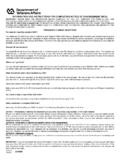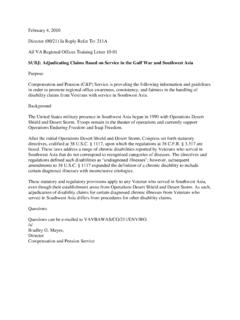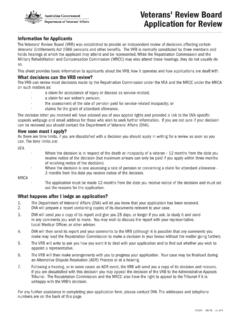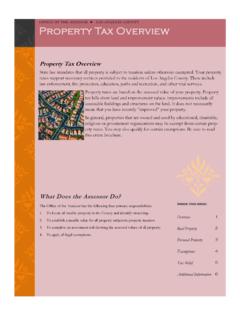Transcription of UNITED STATES COURT OF APPEALS FOR VETERANS …
1 UNITED STATES COURT OF APPEALS FOR VETERANS CLAIMS No. 01-2105 James P. Gutierrez, Appellant, v. Anthony J. Principi, Secretary of VETERANS Affairs, Appellee. On appeal from the Board of VETERANS ' APPEALS (Decided December 23, 2004) Nancy L. Foti and Barton F. Stichman, both of Washington, , were on the brief for the appellant. Tim S. McClain, General Counsel; R. Randall Campbell, Assistant General Counsel; Brian B. Rippel, Deputy Assistant General Counsel; and Kathy A. Banfield, all of Washington, , were on the brief for the appellee. Before GREENE, KASOLD, and HAGEL, Judges. GREENE, Judge: Veteran James P. Gutierrez APPEALS , through counsel, a September 12, 2001, Board of VETERANS ' APPEALS (Board) decision that denied his claim for service connection under 38 1117 for undiagnosed illnesses incurred during the Persian Gulf War.
2 Record (R.) at 1-19. This appeal is timely, and the COURT has jurisdiction under 38 7252(a) and 7266. Because the Board failed to provide an adequate statement of reasons or bases for its decision, the decision will be vacated and the matter remanded to the Board for further action. See Gilbert v. Derwinski, 1 49, 52 (1990). I. FACTS Mr. Gutierrez served honorably on active duty in the Army from May 1987 to July 1991, including service in the Persian Gulf for which he was awarded the Southwest Asia Service Medal. R. at 64, 92. Upon entering service, Mr. Gutierrez's physical condition was normal. R. at 21-26. His service medical records (SMRs) indicate that he was treated for lower-back pain in June 1990. R. at 27, 44. In March 1991, Mr. Guteirrez suffered a "Jones fracture" of his left foot. R. at 51.
3 A Jones fracture is defined as a "fracture of the fifth metatarsal ." Dorland's Illustrated Medical Dictionary 662 (28th ed. 1994). In 1991, he was awarded service connection for residuals of the Jones fracture, and assigned a 10% disability rating. R. at 76. During a July 1996 VA Persian Gulf Registry medical examination, Mr. Gutierrez complained that since July 1991, he had experienced a loss of energy, inability to "work out," dizziness, and light-headedness. R. at 105-11. He also stated that since October 1991, he had experienced aching in his muscles and joints. R. at 106, 108. Mr. Gutierrez further related that since June 1994, he had noticed a loss of his ability to concentrate and a loss of memory. R. at 106. He also reported that he and his wife had been trying to have a child and that he had been told that he had "slow sperm.
4 " Id. The medical examiner reported that Mr. Gutierrez's most severe symptom during the examination was fatigue and that muscle and joint aches, memory loss, and inability to concentrate were all currently present. R. at 352. The examiner did not diagnose any cause for those symptoms. See R. at 105-11. He referred Mr. Gutierrez to outpatient care, but a specific reason was not noted in the examination report. R. at 354. In March 1997, Mr. Gutierrez filed with a VA regional office (RO) a claim for service connection for "Gulf War Syndrome" as manifested by symptoms of joint and muscle pain, dizziness, fatigue, and decreased vision. R. at 79. An April 1997 radiology report showed that he had widespread spinal stenosis and protruding discs at L3-L4 and L4-L5. R. at 197. Dr. David Caldwell, a private orthopedic surgeon, opined that Mr.
5 Gutierrez's episodic lower-back pain and complaints of left-foot numbness were probably related to the L4-5 disc protrusion. R. at 198. The report from a September 1997 VA general medical examination reflects Mr. Gutierrez's assertion that, while he was in the Persian Gulf, he had been exposed to oil-fire smoke and took nerve-gas pills every day. R. at 125. The report also records his complaints of muscle and joint pain, fatigue, a back disorder, light-headedness, and foot difficulties. R. at 125-27. There were no diagnoses made during that VA examination. Id. Additionally, medical records dated September 1997 from a VA Persian Gulf War Clinic reflect that Mr. Gutierrez was suffering from mild fatigue, aches and pains in his joints, and blood in his urine, but provided no medical etiology for these maladies.
6 R. at 332, 367- 68. In October 1997, the RO denied Mr. Gutierrez's claim after concluding that his symptoms were not incurred in or caused by his service in the Persian Gulf. R. at 137-141. The RO found that his complaints about his claimed conditions were first made during the Persian Gulf War Registry examination in July 1996 and that his SMRs were negative for fatigue, dizziness, and joint and muscle pain. R. at 138. Mr. Gutierrez appealed to the Board and argued that he began suffering from his claimed symptoms within a year after his discharge from service and that they were now more constant and persistent. R. at 145-46, 191-92. During an appeal to the Board, Mr. Gutierrez submitted statements from his Wife (R. at 150), a friend (R. at 202) ("[I] have noticed a decline in his general health. He has [not] been as active as [I] am used to seeing him.)
7 "), and his father (R. at 203). His Wife stated: "I have noticed a decline in his general health. He does [not] seem to have as much energy, tires quickly, complains of aches [and] pains throughout his body, and seems to forget information easily." R. at 150. Those statements provided individual and personal observations of Mr. Gutierrez's declining health. Additionally, a February 1998 VA vision examiner diagnosed Mr. Gutierrez as having compound myopic astigmatism with hysterical visual fields. However, no cause for this defect was provided. R. at 154-55. That same month, Mr. Gutierrez was given a VA spinal examination but no diagnosis was made for any specific illnesses causing his complaints of joint and muscle pain, fatigue, dizziness, memory loss, or loss of concentration. R. at 157-59. While being examined in March 1999, Mr.
8 Gutierrez again complained of easy fatigability, decreased vision, and foot and back pain. R. at 227-29 . No cause for his fatigue was determined. Medical records from a Gulf War Clinic, dated November 15, 1999, also revealed that he had reported having painful and aching joints. R. at 329. In May 2000, the Board remanded to the RO Mr. Gutierrez's claim for readjudication. The RO was ordered to first obtain results from VA's Gulf War Study Program and additional medical records that had been identified by Mr. Gutierrez. R. at 319. In August 2000, the RO issued a Supplemental Statement of the Case (SSOC) confirming the denial of Mr. Gutierrez's claim. R. at 383. He appealed to the Board and submitted VA medical records dated April 25, 2001, that indicated that he had complained of problems with sleeping, concentrating, and low energy, and that he had advised the examiner that he felt irritable, nonsocial, and unmotivated.
9 R. at 426-27. VA medical records dated from March through December 2000, documented Mr. Gutierrez's continued complaints of fatigue, low energy, poor concentration, and sensitivity to loud noises, and recorded his concern that he may have arthritis in his left leg related to his claimed symptoms. R. at 327, 423-25. These records also reflect that Mr. Gutierrez complained of having trouble sleeping. Id. After reviewing the evidence, the Board, in the September 12, 2001, decision on appeal , denied Mr. Gutierrez's claim. The Board stated: "The Board does not believe that [Mr. Gutierrez] has had fatigue, dizziness, memory loss, and a loss of concentration since his discharge from active service." R. at 17. The Board specifically found that "there is no competent evidence of an Undiagnosed illness manifested by joint and muscle pain, fatigue, dizziness, decreased vision (other than the use of glasses), memory loss and loss of concentration associated with the veteran's active service" and concluded that Mr.
10 Gutierrez's complaints of these conditions over an extended period of time were "not credible" and purely subjective. R. at 3, 17. The Board stated further: The only evidence of record before the Board specifically linking [Mr. Gutierrez's] current alleged disabilities to his service or Gulf War Syndrome consist of the veteran's own evidentiary assertions. Such evidence is of limited probative weight. While the veteran is competent to describe manifestations perceivable to a lay party, he is not competent to diagnose himself with disabilities and then associate those disabilities with his active service or with any form of Persian Gulf Syndrome. R. at 16. In conclusion, the Board found that "the preponderance of the medical evidence fails to indicate that these disabilities are related to service or illness associated with service.








